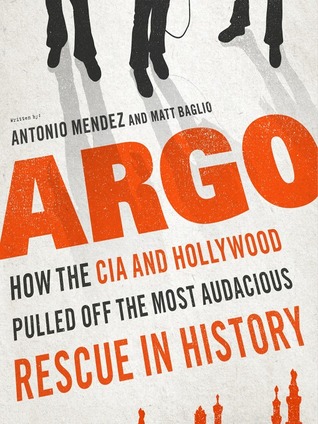This week I'm taking a look at Argo, a book which talks about the CIA operation to rescue six American diplomats from Iran in the wake of the embassy invasion of 1979. The book takes the form partly as a history of the Iran hostage crisis and the events leading up to Argo, and partly a memoir of Antonio Mendez, an experienced CIA operative who orchestrated and ran the Argo operation, personally helping the six diplomats out of Iran. Personally I preferred the more historical perspective aspects, such as talking about the background to the 1979 crisis which has caused an over thirty year break in relations between the United States and Iran. I don't think I've read (or in this case listened to) many if any memoirs whatsoever and at least in this case I found it a little too subjective at times.
First, to provide some necessary historical context. Iran was a key strategic ally for the United States after World War II. First of all, they had oil, which both the British and Americans were happy to buy. Secondly, they were located in a key strategic area bordering both the Persian Gulf and the Soviet Union, giving them immense geostrategic importance. As a result, the Americans were perfectly happy to prop up the corrupt and repressive regime of the shah in exchange for very friendly relationships with Iran. To the point that when the power of the shah was severely restricted in the 1950's, the CIA was deeply involved in restoring the shah's absolute power.
Over a period of about twenty years, many Iranians grew increasingly resentful of the repressive regime of the shah, as well as American and British support of the regime. This resulted in a revolution in 1979 which finally ousted the shah for good and created the heavily religious government which Iran is still influenced by today. However, the revolution reached a new level of crisis when the American embassy in Tehran was stormed by Iranians and some fifty-odd American diplomats were taken hostage. This crisis is widely cited as one of several reasons why Jimmy Carter would go on to lose the 1980 election. However, six members of the embassy staff managed to escape. One member of the staff had his office across the street and was able to take refuge in the Swedish embassy. Another five worked at a consular visa office not part of the main embassy compound and managed to slip into the streets of Tehran, first taking refuge at a British compound, then various houses, before finally finding more permanent refuge with Canadian diplomats.
Although they were safe for the time being, if the six diplomats remained in Iran too long the chances of them being discovered only increased. And since they had escaped the day the embassy was stormed, it was very likely the Iranians would assume they were spies and execute them. The CIA and the Canadian government worked together and eventually created a plan which allowed the six diplomats to leave Iran on a commercial flight, disguised as Hollywood movie executives.
And that's basically the story. I hate to say it, but the operation actually went so smoothly it was kind of boring. Which is a good thing considering six diplomats that could have been executed were successfully retrieved from a hostile country. But it lacks a certain amount of panache. And I feel like Mendez was vaguely aware of this fact because he spends a considerable amount of time talking about things like his childhood in Nevada and his eventual recruitment to the CIA, which is the more memoir bits which I didn't enjoy as much.
Most of the book is used in setting up context, going over necessary contextual bits of spycraft, and going into the amount of detail Mendez spent on making sure the identities they would be using for the six diplomats were fully ''backstopped'', which means that there was an actual movie office staffed with an actual secretary so if someone decided to call the number on one of the business cards of the ''movie executives'' they would have gotten enough information to confirm their identity. As Mendez says, the level of backstopping they did for the movie crew aliases wasn't so much for the Iranians, although it would have been extremely helpful if the Iranians had been more interested. It was mostly for the diplomats themselves, a group of people utterly untrained in spycraft who needed to be convinced an idea that was frankly rather ridiculous would actually work.
Overall the book is okay. Mendez's opinions slip into the work from time to time and it gave me some doubts. As I said, the book is mostly set up for the operation which actually went rather smoothly, all things considered. I'm a little curious about if there are any other resources on Operation Argo but, since it was a classified operation after all, that seems rather unlikely.
- Kalpar


No comments:
Post a Comment